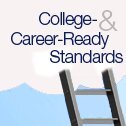The University of Virginia recently released a study showing that one-third of children who start kindergarten in that state aren’t well prepared for it. Today, the Oregon Department of Education released test results showing that fewer than 2 in 10 can name or sound out letters, or perform early mathematics operations.
Assessments like these are intended to help teachers get a better picture of their incoming classes so they can tailor instruction to meet their needs. But they’ve sparked lots of concern, too.

As I reported last fall, kindergarten-entry assessments are becoming more popular, with the support of the federal government. Many in the early-childhood field worry that the tests are developmentally inappropriate, and that a testing culture is replacing a culture of play-based learning in the youngest grades.
Less talked about, though, is the effect of the messages that states risk sending to the public when they release the data.
Take a look at the headline the Washington Post put over its story about the UVA findings:

The Post’s story about the UVA findings reported that a third of Virginia children “rated poorly” and repeatedly used the phrase “fell short.” The University of Virginia’s own summary of the research described some children as “unprepared” for kindergarten, or “lacking” in the skills considered appropriate for it.
To its credit, the Oregon Department of Education issued materials about its kindergarten-readiness results that didn’t use those words.
“The Kindergarten Assessment provides a means by which to honor the diverse early learning experiences children have before they enter school while highlighting areas where resources can be targeted to better serve families and children,” the department said in a press release. "[The] results provide a snapshot of the extent to which children are starting school with the skills that will allow them to engage in and benefit from the opportunities and experiences provided to them.”
The department’s language emphasized providing resources to support children’s and families’ needs.
But in some places, such test results are used as the basis for funding decisions. That has a damaging effect on the learning environment in the early grades, professor and early-childhood activist Nancy Carlsson-Paige told me.
“Teachers fear for their programs and jobs and thus drill young kids early so they can achieve good scores,” she wrote in an email.
The Alliance for Childhood has been raising flags about the growing emphasis on testing and unrealistic academic expectations in the early grades. The alliance, along with another group, Defending the Early Years, issued a new paper about it just this week. Alliance co-founder Joan W. Almon said that the biggest problem with kindergarten-entry tests is that they look for the demonstration of skills most children inherently lack as they enter the K-12 system.
“Expectations for pre-K and [kindergarten] achievements deviate widely from the norms of child development,” she wrote in an email. “This gap is especially problematic for children from low-income homes where parents have lower education levels. The children have not had the same exposure to print literacy, oral language, or the type of life experiences captured in books as compared to children from wealthier, more-educated homes. We expect them to have the same background as middle-income children and they don’t, so right from the outset they are judged as lacking.”
Sending the message that children are “lacking,” even before they reach kindergarten, is a danger that states face as they size up what their 5-year-olds know and can do. The news media, too, must guard against that kind of messaging as we report on these assessments.
